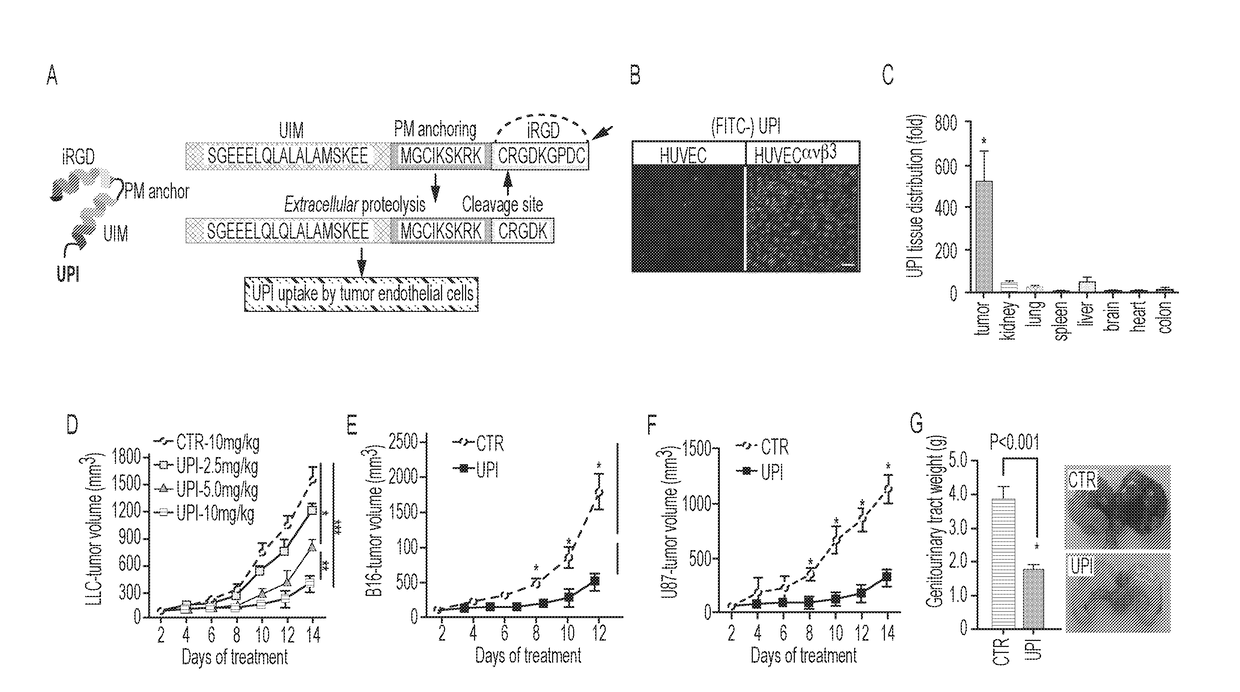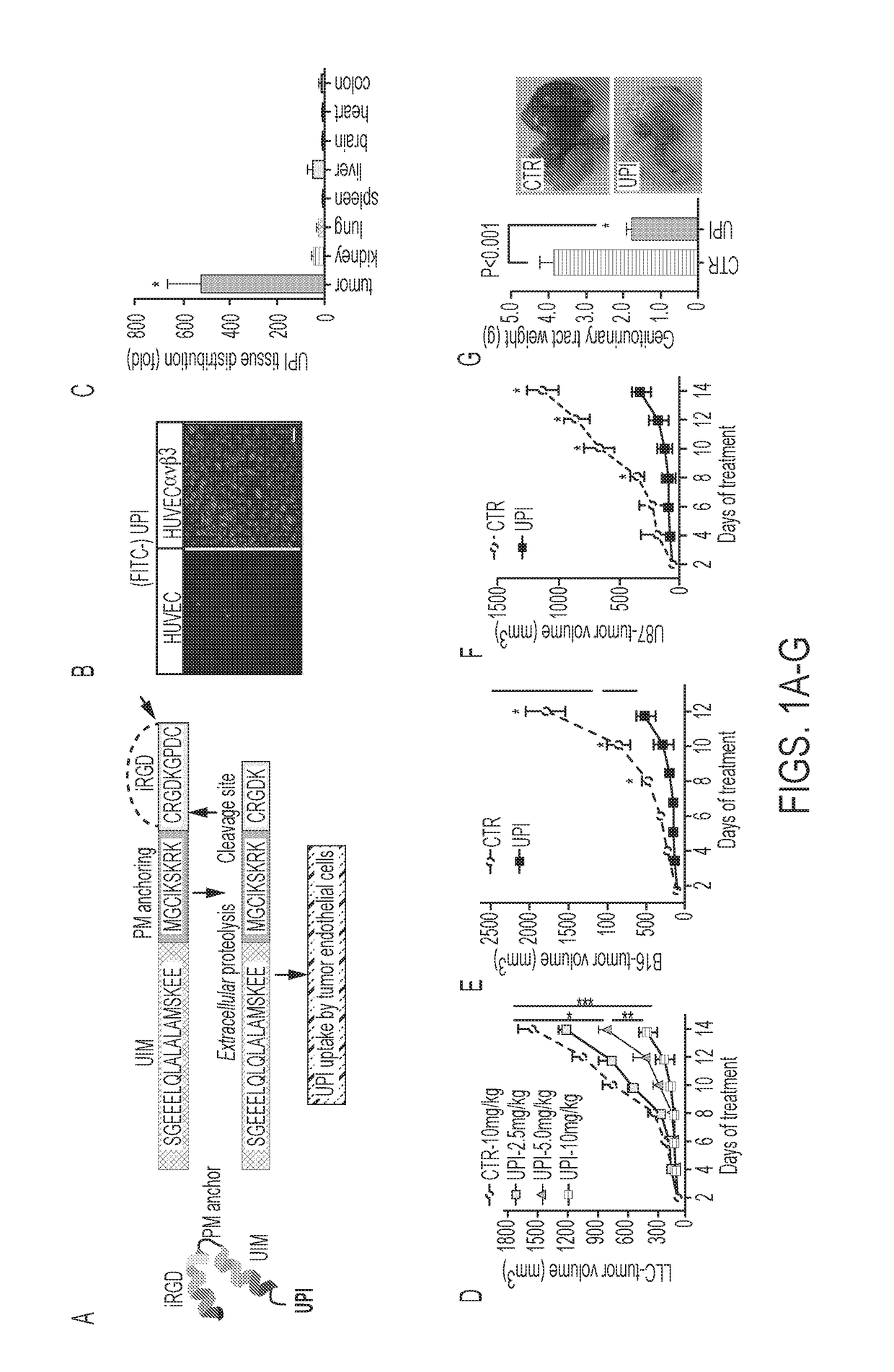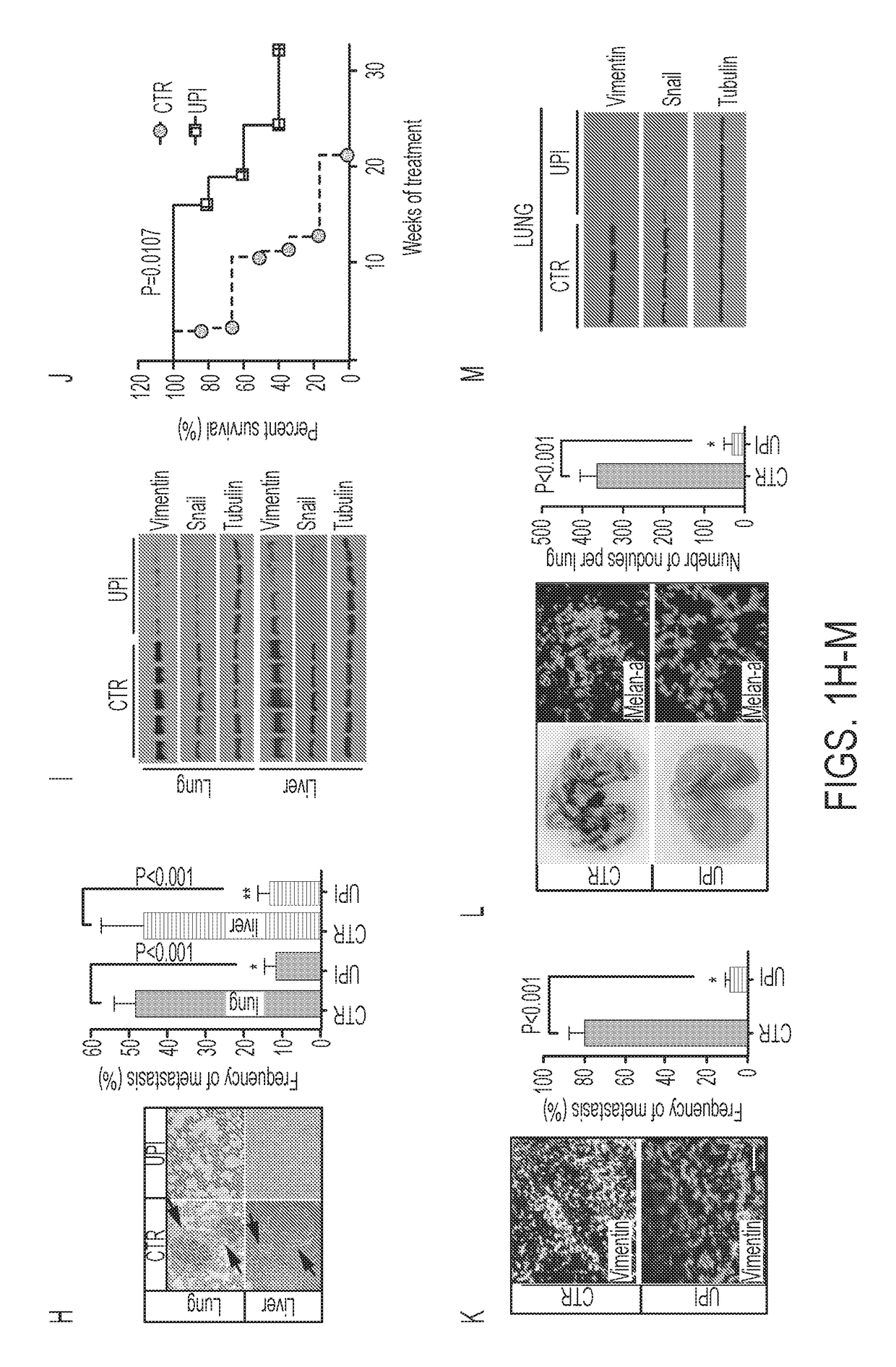Ubiquitin interacting motif peptides as therapeutics
a technology of ubiquitin and interacting motif, which is applied in the field of oncology and antiangiogenic therapy, can solve the problems of heart disease, perhaps the most significant healthcare burden in the world in terms of cost, and fatty streaks that reduce the elasticity of the artery wall, so as to reduce tumor burden, reduce tumor growth, and reduce tumor size
- Summary
- Abstract
- Description
- Claims
- Application Information
AI Technical Summary
Benefits of technology
Problems solved by technology
Method used
Image
Examples
example 1
[0232]A. Materials and Methods
[0233]Antibodies, Reagents and Chemicals.
[0234]Polyclonal rabbit antibodies for epsins 1 and 2 were obtained as previously described (Pasula et al., 2012 and Rosenthal et al., 1999). Epsin 1 antibody (goat) was purchased from Santa Cruz Biotechnology. Anti-phospho-VEGFR2 (pY11175), anti-PLCγ, anti-ERK, anti-phospho-ERK, anti-AKT, anti-phospho-AKT, anti-PDGFR-β and anti-Snail antibodies were purchased from Cell Signaling Technology. Anti-phospho-VEGFR2 (pY1054 / 1059) antibody was purchased from Millipore. Anti-FGFR1 antibody was purchased from Abcam. Anti-EGFR antibody was purchased from Rockland. Anti-vimentin antibody was purchased from Dako. VEGF-A, FGF and PDGF were purchased from R&D systems. VEGFR2 kinase inhibitor was purchased from Calbiochem. BrdU, 4-hydroxytamoxifen and human fibronectin were purchased from Sigma. Anti-CD31 antibody and matrigel (in vitro and in vivo-phenol-free) were purchased from BD Biosciences. Integrin αv and β3 plasmids we...
example 2
erosis
[0302]A. Materials and Methods
[0303]Tamoxifen-inducible Cre-driven global (iDKO) and constitutive Ve-cadherin Cre-driven endothelial-cell specific (EC-DKO) epsin 1 and 2 double knockout mice in ApoE− / − genetic background were established and fed western diet (WD) for ten weeks. Aortic lesions were analyzed by histology and oil red O staining. Expression of selectins, adhesion molecules and chemoattractants were analyzed by western blot or real time PCR (RT-PCR). Molecular mechanism was identified by molecular / cellular, biochemical, and genetic approaches.
[0304]B. Results
[0305]Histological analysis revealed that global epsin deletion in ApoE− / − mice significantly reduced atherosclerotic lesion area in aortic arch compared to control ApoE− / − mice. Similar results were obtained in aortic root by oil red O staining. Similarly, EC-iDKO in ApoE− / − mice presented reduced atherosclerotic lesion in aortic arch and root (FIGS. 19A-C). Accordingly, macrophage infiltration is also reduced...
example 3
[0312]Generation of Tamoxifen-Inducible Global Epsin DKO (iDKO) Mice.
[0313]Global deficiency of epsins 1 and 2 (DKO) causes embryonic lethality (Chen et al., 2009). To study epsin function in specific cell types and to circumvent lethality, the inventors generated mice in a C57BL / 6 background with epsin 1 flanked by loxP sites (epsin 1f / f) on a global epsin 2-deficient background (epsin 1f / f epsin 2− / −). iDKO mice were created by crossing epsin 1f / f epsin 2− / − mice with Cre-ERT2 deleter mice that express Cre recombinase in all cells upon tamoxifen injection (Hayashi & McMahon, 2002). Control wild-type (WT) mice are defined as epsin 1f / f epsin 2+ / +, Cre-ERT2-negative or epsin 1+ / +, epsin 2+ / +, Cre-ERT2-positive (with or without tamoxifen injection). After tamoxifen administration for ˜10 days, the inventors examined epsin 1 expression in majority variety of tissues or organs. Results suggest that epsin 1 expression in major insulin targeting tissues, adipose, skeletal muscle and live...
PUM
| Property | Measurement | Unit |
|---|---|---|
| concentration | aaaaa | aaaaa |
| time | aaaaa | aaaaa |
| pH | aaaaa | aaaaa |
Abstract
Description
Claims
Application Information
 Login to View More
Login to View More - R&D
- Intellectual Property
- Life Sciences
- Materials
- Tech Scout
- Unparalleled Data Quality
- Higher Quality Content
- 60% Fewer Hallucinations
Browse by: Latest US Patents, China's latest patents, Technical Efficacy Thesaurus, Application Domain, Technology Topic, Popular Technical Reports.
© 2025 PatSnap. All rights reserved.Legal|Privacy policy|Modern Slavery Act Transparency Statement|Sitemap|About US| Contact US: help@patsnap.com



